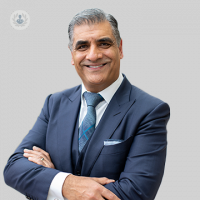Navigating atrial fibrillation: Insights and solutions
Written by:In his latest online article, Mr Inderpaul Birdi gives us his insights into atrial fibrillation. It is characterised by irregular and often accelerated heart rhythms, poses a heightened risk of stroke, heart failure, and related complications. This condition arises when the upper chambers of the heart quiver instead of contracting normally.

The pervasive nature of atrial fibrillation
Atrial fibrillation is more prevalent than commonly perceived. Undoubtedly, it stands as one of the most widespread heart rhythm disorders globally, impacting millions. With a direct correlation to age, its incidence escalates, foreseeably surging as our population ages.
The perilous ramifications: Unpacking the severity of atrial fibrillation
Stroke vulnerability: Atrial fibrillating hearts, failing to contract properly, foster blood pooling and clot formation. These clots can journey to the brain, precipitating strokes. A substantial percentage of all strokes is attributed to atrial fibrillation.
Heart failure: Over time, atrial fibrillation can debilitate the heart, culminating in heart failure. The irregular rhythm undermines the heart's pumping efficiency, diminishing its capacity to meet the body's demand for blood and oxygen.
Diminished quality of life: Atrial fibrillation induces symptoms like palpitations, shortness of breath, fatigue, and dizziness, significantly impinging on daily activities and overall well-being.
Blood clot peril: Beyond stroke, atrial fibrillation heightens the risk of blood clots in various body regions, potentially causing fatal conditions such as pulmonary embolism.
Mortality concerns: An augmented risk of death is intricately linked to complications stemming from atrial fibrillation, notably stroke and heart failure.
The imperative of early detection and management
Given the grave consequences of atrial fibrillation, proactive measures are imperative. Consider the following steps:
Regular health assessments: Routine check-ups prove instrumental in early atrial fibrillation detection, especially for individuals with risk factors like high blood pressure, diabetes, or a family history of heart disease.
Heart rhythm monitoring: Employ devices like smartwatches and portable monitors for continuous heart rhythm surveillance, promptly identifying irregularities.
Lifestyle adjustments: Mitigate risk by adopting lifestyle changes—stress management, physical activity, a balanced diet, and controlled alcohol and caffeine consumption.
Medications and interventions: Upon diagnosis, healthcare providers may prescribe medications to regulate heart rate and rhythm. Interventions like ablation or blood thinners may be recommended in certain cases.
Advocacy and education: Raising awareness and advocating for regular heart health check-ups on both individual and societal levels is crucial.
Treatments for atrial fibrillation
Thankfully, effective treatments abound for managing atrial fibrillation. Here are three primary options:
Medication: Anticoagulants and antiarrhythmic drugs are commonly prescribed to control heart rhythm and rate, mitigating clot and stroke risks.
Catheter ablation: This minimally invasive procedure targets abnormal electrical signals, effectively alleviating or eliminating atrial fibrillation episodes.
Convergent atrial fibrillation ablation: A multidisciplinary approach involving a cardiac electrophysiologist and cardiothoracic surgeon, this procedure combines endocardial and epicardial ablation for complex cases.
Mr Inderpaul Birdi is an esteemed cardiothoracic surgeon with over 30 years of experience. You can schedule an appointment with Mr Birdi on his Top Doctors profile.


